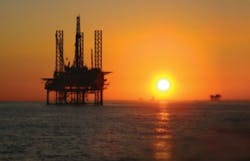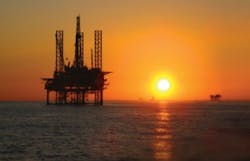Twilight or dawn in the Gulf of Mexico?
The Chevron-operated Hercules 173 in Gulf of Mexico shallow waters. Photo courtesy of Hercules Offshore
Don Stowers,
Editor — OGFJ
By the time this issue of Oil & Gas Financial Journal goes to press, the US Department of the Interior will probably have issued the first new deepwater drilling permits in the Gulf of Mexico since the Deepwater Horizon well blowout last April 20. However, the offshore industry needs to know: Is this a token action or will the number of permits issued return to previous levels?
Oil and gas companies have sharply criticized the Obama administration for creating a de facto drilling ban in the Gulf long after the official drilling moratorium put into effect after the BP oil spill was lifted. Offshore operators with excellent safety records believe they are all being punished unjustly for an accident that happened to one operator, BP.
"The perception was that we were a permitting mill…It would be irresponsible to approve new drilling before we have answered the simple, yet compelling question, ‘How do you deal with it.'" — Michael Bromwich, BOEMRE
©2011 Michael Stravato. Provided courtesy of the James A. Baker III Institute for Public Policy, Rice University
As of late February, not a single new deepwater permit had been granted except for two water injection wells. Only 31 drilling permits for the shelf were issued during this period. This compares with an average of about 20 shallow-water permits per month prior to April 20, creating a deficit of about 130 wells that weren't drilled on the shelf during the past 10 months.
On Feb. 11, the Baker Institute for Public Policy at Rice University in Houston held a conference aimed at examining the policy implications of the deadly explosion in the Gulf and the subsequent oil spill as well as the economic and political impact of the shutdown in new drilling activity. Addressing conference attendees, Michael Bromwich, director of the Bureau of Ocean Energy Management, Regulation and Enforcement (BOEMRE), said the domestic offshore industry should not expect his agency to begin issuing new permits until fundamental questions concerning disaster prevention and spill containment plans have been answered.
"It would be irresponsible to approve new drilling before we have answered the simple, yet compelling question, ‘How do you deal with it,'" said Bromwich.
BOEMRE, a division of the Interior Department, regulates offshore exploration and production and was formed after the previous regulator, the Minerals Management Service (MMS), was dissolved after facing criticism it was a "rubber stamp" for the petroleum industry.
Speaking before a gathering of about 200 or so energy executives, academics, and reporters, Bromwich emphasized his agency's commitment to aggressive regulation and enforcement, adding that it isn't likely permitting will ever return to the levels prior to the Deepwater Horizon disaster.
"The perception was that we were a permitting mill," he said, adding that the drilling permit process will now take longer due to tougher safety and environmental standards put in place following the incident.
Although Bromwich said he didn't anticipate any further rulemaking, the offshore industry is concerned about delays caused by extensive reports, analyses, meetings, and what one policy wonk called "bureaucratic foot-dragging."
BOEMRE plans to prepare an Environmental Impact Statement (EIS) for proposed oil and gas lease sales in the Western and Central Planning Areas of the Gulf of Mexico, off the coasts of Texas, Louisiana, Mississippi, and Alabama, for the five-year oil and gas leasing program from 2012 to 2017.
"This important step in the offshore resource evaluation and development process will help ensure that all interests and concerns regarding oil and gas leasing, exploration, development, and production from proposed sales are appropriately considered," said Bromwich. "Every comment will be analyzed and considered as we continue to prepare for the next five-year program."
Interior Secretary Ken Salazar and Marine Well Containment Company CEO Marty Massey view the company's interim system capping stack with industry and government officials. Photo courtesy of Business Wire
Noble Corp. is among the drillers that have grown tired of waiting for Washington to act. The company recently said it will move its Clyde Boudreaux rig to Brazil because the current leaseholder in the Gulf of Mexico declined to extend its contract with Noble due the lack of permits being issued by BOEMRE.
Roger Hunt, Noble's senior vice president for marketing and new contracts, told analysts in a recent conference call that the company has endured the moratorium but finally has decided it cannot wait any longer. The company said there was too much uncertainty, and this situation had contributed to a serious decline in fourth-quarter profits.
Another speaker at the Baker Institute forum expressed concern about the "new regulatory environment" in Washington. Karen Harbert, president and CEO of the Institute for 21st Century Energy for the US Chamber of Commerce, said she is afraid this will "put the government in the boardroom." She added, "We don't need more regulation — we need better regulation. The government has an obligation not to change the rules of the game every two years."
Harbert added, "You may not realize this, but there is more opportunity than there is capital," adding that Gulf of Mexico operators could move their rigs elsewhere if regulations and the cost of drilling in the Gulf become too onerous.
J. Robinson West, chairman and CEO of PFC Energy, an energy advisory firm, concurred, "The industry is going to invest in the deepwater. The money will be spent, but it will go elsewhere if drilling doesn't resume soon."
He added, "Whatever oil isn't produced in the Gulf will have to be imported."
According to a July 2010 report by IHS Global Insight, the Gulf of Mexico oil and gas industry generated almost $70 billion of economic value and 400,000 jobs in 2009. The Greater Houston Partnership noted, "A restriction on offshore drilling results in significant job losses, lose government revenues, and decreased national security."
However, Shirley Neff, a senior analyst with the National Commission on the BP Deepwater Horizon Oil Spill and Offshore Drilling, said their research shows that stricter regulation is needed.
"We have a higher fatality rate in the Gulf of Mexico than elsewhere [in the world]," said Neff. She pointed to Norway, Canada, Australia, Brazil, and the United Kingdom as examples of countries with better safety records than the US. She also pointed out that the US government currently regulates operators, but not other companies operating in the deepwater arena, and this is an area that needs to be addressed.
"What happened in the Gulf of Mexico, obviously, was tragic. It never should have happened. But I continue to believe it's an anomaly. I simply do not accept the notion that there is a systemic issue with safety and operating capability across the industry. That defies logic." — John Hofmeister, former president of Shell Oil Co.
The drilling moratorium that went into effect after the deadly April 20 blowout just 40 miles off the Louisiana coast was lifted in October by Interior Secretary Ken Salazar. Although, to date, it has not led to the issuance of any new deepwater drilling permits, there are signs that is about to change.
Salazar, in lifting the moratorium, said that information gathered in recent months shows "significant progress in reforms to drilling and workplace safety regulations and standards, and increased availability of oil spill response resources since the Macondo well was contained on July 15 and killed on September 19, and improved blowout containment capabilities."
He added, "The oil and gas industry will be operating under tighter rules, stronger oversight, and in a regulatory environment that will remain dynamic as we continue to build on the reforms we have already implemented."
Salazar has acknowledged that the new, more stringent rules would add to the cost of deepwater projects, but he said he didn't know to what extent.
Two projects have helped a great deal in moving forward the drilling permit process:
- The creation of new oil spill response task forces by NOIA, IPAA, and API to respond to oil spills in the Gulf of Mexico, and
- a new interim containment system launched by Marine Well Containment Company, a not-for-profit, independent organization formed by several oil majors and open to all oil and gas operators in the US Gulf of Mexico.
The task forces will review spill response actions that occurred in the Macondo well spill and make recommendations as to how to improve future response and containment efforts.
"A recurring theme…is that the technology exists to drill successfully in deeper and deeper water, but the technology to respond to release of oil in these environments appears not to have kept pace," said NOIA president Randall Luthi.
On Feb. 25, Salazar and Bromwich visited Houston to view a new capping stack built by Marine Well Containment Company (MWCC). The system will provide rapid containment response capabilities in the event of a potential future underwater well control incident in the deepwater Gulf.
"The interim well containment system is complete and available for use," said Marty Massey, MWCC's CEO. "Over the past six months, we have worked closely with BOEMRE, the Coast Guard, and other authorities to help ensure that the design meets the regulatory requirements. BOEMRE has reviewed the functional specifications of the interim response system and its input has been included in the final specification."
He added, "Our objective is to ensure that the well containment response system is in a state of continuous operational readiness to facilitate rapid deployment and response in the event that it is required."
The capability of the interim containment system will continue to build as components of the expanded system are completed and delivered to MWCC. Massey says the expanded system is on track to be completed in 2012.
A second well containment system being developed by Helix Corporation is expected to be ready by the end of March.
John Hofmeister, former president of Houston-based Shell Oil Co. who now heads Citizens for Affordable Energy, a public policy organization aimed at educating the public about energy, recently told the Houston Business Journal, "What happened in the Gulf of Mexico, obviously, was tragic. It never should have happened. But I continue to believe it's an anomaly. I simply do not accept the notion that there is a systemic issue with safety and operating capability across the industry. That defies logic."
More Oil & Gas Financial Journal Current Issue Articles
More Oil & Gas Financial Journal Archives Issue Articles
View Oil and Gas Articles on PennEnergy.com




